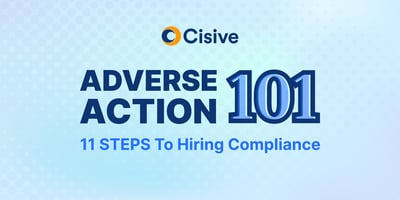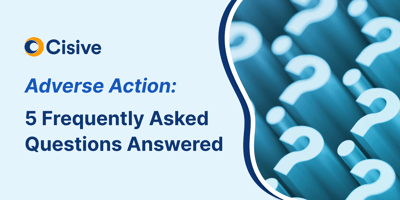

Employers rely on background checks to maintain a safe and productive work environment. As you vet...

As an employer, background checks are part of your hiring process. You can screen candidates based on work history, education, criminal records, and more. A background check helps you decide whether you want to hire an applicant.
So, let’s say a background check is a factor in not moving forward with hiring a candidate. It’s not enough to simply tell the candidate that you’re rejecting them, and it’s not even enough to tell them it’s due to the background check. Failing to follow specific procedures could expose your company to lawsuits, financial penalties, accusations of discrimination, and more.
When denying a hire based on a background check, you must follow the adverse action process. This process ensures fair treatment of all applicants.
Below, we look at what adverse action is, why it’s important, and the legal risks of making an adverse action mistake.
Key TakeawaysHere are the key things you can expect to learn about adverse action:
|
Table of Contents
In a broad sense, an adverse action is the action of denying a request or application based, in whole or in part, on information in a background check.
How an adverse action is applied changes based on the context. Some examples of adverse action in different contexts are:
In employment, adverse action refers to any action taken by an employer against an current or prospective employee, that may be considered “adverse” or negative. This can happen during hiring, resulting from information returned during the screening process, or during ongoing monitoring of current employees.
For hiring specifically, the definition of adverse action is as follows:
Denying employment or rescinding a job offer based on information in a background check.
When a background check shows concerning information, the employer goes through an adjudication process, where they review the background check and decide whether to hire an applicant. If the employer is considering denying employment based on the background check, they must follow the adverse action process.
Some examples of adverse action during the hiring process may include:
The Fair Credit Reporting Act (FCRA) requires employers to follow a two-step adverse action process when denying a hire based on a background check.
When considering an applicant, you should identify issues that may warrant adverse action. For instance, what is the concerning issue? What is the severity or nature of the issue? Does the issue impact the job position?
A step-by-step process helps you identify the issues of concern and gage any potential risk impact when deciding whether to hire the candidate, while helping to avoid costly mistakes.
Let’s take a closer look at how adverse action works.
You perform a background check on your own or through a background check provider like Cisive. Our background checks provide comprehensive information so you can decide whether to move forward with a candidate.
When the processes of adverse action is triggered, has been hotly debated amongst experts and in courts many times when employer screening processes have been challenged. However, the consensus seems to be that the processes of adverse action may be triggered as soon as a question is raised from information returned in the background report.
NOTE: The actual processes of adverse action may even be nuanced by additional state or local laws (Fair Chance) based on where the actual employment opportunity is located.
If the results of the background screening your company uses raise some red flags, assess the situation with these steps:
The Equal Employment Opportunity Commission (EEOC) provides guidelines to help you assess the information. Doing so helps you avoid potential mistakes or claims of discriminatory practices. When, for example, a criminal information is revealed in a background check, start by asking three questions:
The EEOC also recommends reviewing these additional factors to establish the proper context of the information.
Using the Green Factors is important because it gives you a clearer picture of the candidate instead of limiting your focus solely on the criminal offense. It also gives you a standard to go by to ensure consistency when evaluating any potential risks identified by your screening process.

Now, on to the adverse action steps:
Send a notice to the candidate stating that you are considering not hiring them for the job. This is commonly referred to as a pre-adverse action letter or pre-adverse action notice, and it informs the candidate that you are considering information contained in the results of their criminal background check. The notice should also include two additional items.
Also, invite the candidate to request an individualized assessment or to provide other items for your consideration, including evidence of their rehabilitation.
Some states may require you to provide additional information or documents. You may need to add state law regulations and additional notices of rights or cite the specific criminal record(s) in question.
You must provide a waiting period for the candidate to respond to your notice. This pause in the process gives the person time to receive the documents and review the report. They can also use the time to dispute inaccurate information if needed.
Seven to ten days is generally considered enough time for the applicant to receive the document and make the necessary response. Check with your state or local governments to find out whether there any specific requirements or mandated waiting period regulations.
Carefully look over the applicant’s response. If they have claimed or filed a dispute, you’ll need to allow the reporting agency to investigate the dispute and resolve the claim. This may result in an extended waiting period.
If you receive no response or don’t hear from the candidate within the waiting period, you can make your final decision.
If you decide not to hire the applicant, you are required to send a final notice. The notice includes your final decision and informs the applicant that they have a right to dispute the decision. You must also inform them that they’re entitled to receive an additional copy of the background check within the next two months (60 days).
If you hire a CRA (credit reporting agency) or a background check provider like Cisive, you need to include the following information:
Some states may require you to provide additional information or documents. You may need to add state law regulations and additional notices of rights or cite the specific criminal record(s) in question.
Remember, the CRA and provider cannot provide employers any information outside of the report.
The FCRA regulates how employers use consumer reports when making employment decisions. It outlines specific requirements employers must follow if they want to take adverse action (deny employment) against a job applicant. It also notes what actions to take when denying employment based on a criminal background check.
The FCRA protects applicants from discrimination and other unfair or unethical hiring practices. Following adverse action processes safeguards you as the employer from potential lawsuits or legal penalties.
But compliance is not the only benefit. Let’s go into more detail about other benefits of adverse action.
Getting quality candidates is difficult when you don’t implement a smooth, effective screening process. This is especially true if you make mistakes that result in serious consequences and hurt your company’s reputation. When you follow a reliable hiring process and adhere to legal standards, you’re more likely to hire the right candidates.
Adverse action doesn’t directly help you employ better candidates. However, it does improve your overall process of screening and communicating with candidates.
You need to communicate with the applicant when an issue arises in their background check. Candidates may be disappointed when they don’t get a job. However, disappointment turns into frustration and disillusionment when they don’t know why they were not hired.
Adverse action is the vehicle for communication. It helps you follow a procedure that informs the applicant of your decision and the reasons behind it. It provides an avenue to address issues upfront instead of taking the evasive route. And if you do end up hiring the candidate, any potential issues will have already been addressed prior to their employment.

Failing to properly follow adverse action procedures can have severe consequences for your company. The adverse action requirements under the FCRA are strict. Even minor errors can throw your company into significant legal risks and result in financial penalties.
Here are some potential consequences of adverse action mistakes:
You face significant legal risks like costly lawsuits if you fail to follow adverse action procedures.
Even minor missteps in your process can expose your company to class-action claims and multi-million-dollar settlements under the FCRA. Penalties can include statutory and punitive damages as well as hefty fines.
Job candidates talk to one another about their experience when applying to your company. Failing to follow proper procedures exposes your organization to costly lawsuits and negative publicity that undermines your brand's credibility and commitment to fair employment practices. Even inadvertent missteps can be detrimental.
By not following adverse action, you deny applicants their legal right to dispute inaccurate background check information before you finalize hiring decisions. You have potentially treated a job candidate unfairly or denied an employee due process.
Unfair treatment leaves candidates feeling mistreated or even insulted by your company. Even if they don't pursue legal action, you've likely lost their trust.
At Cisive, we understand the complexities and legal risks surrounding adverse action procedures. We offer employee screening solutions to help you remain compliant when making tough hiring decisions.
Our integrated workflow seamlessly guides employers through the required pre- and post-adverse action notifications based on customizable settings. We generate and distribute adverse action notices on your behalf, ensuring proper documentation and adherence to waiting periods.
Our all-in-one platform helps you safely store adverse action records and maintain an auditable trail of all communications sent to candidates. We make it simple to initiate individualized assessments, select potentially disqualifying records, and include all mandated disclosures as attachments.
Following adverse action best practices can prevent lawsuits and claims against your company. It also fosters goodwill between your business and potential hires. If you’re looking for a background screening company to help you with your hiring process, contact Cisive. We’re the leaders in background screening and compliance.
Fill out our online form or call to speak to an expert.
Author: Michael Kendrick
Bio: Senior Manager of Corporate Compliance at Cisive.
Let's Connect on LinkedIn
Employers rely on background checks to maintain a safe and productive work environment. As you vet...

Employers that use background screening methods to vet potential employees are likely aware of...

Understanding how the adverse action process works is crucial to staying on the right side of the...